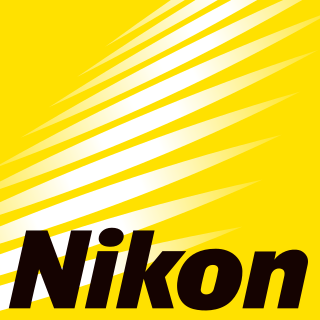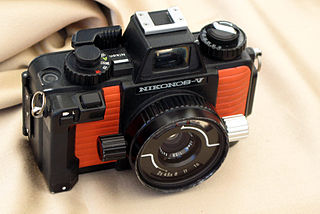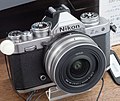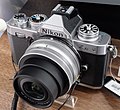
Nikkor is the brand of lenses produced by Nikon Corporation, including camera lenses for the Nikon F-mount.

Nikon Corporation is an optics and photographic equipment manufacturer headquartered in Tokyo, Japan. The companies held by Nikon form the Nikon Group.

The Nikon FM2 is an advanced semi-professional, interchangeable lens, 35 mm film, single-lens reflex (SLR) camera. It was manufactured by Nippon Kogaku K. K. in Japan from 1982 to 2001. The original camera was released with some incremental improvements in 1984, and this later version is commonly referred to as the FM2ɴ, although both versions are labelled as the FM2 on the front of the camera body.

The Nikon FE2 is a 35 mm single lens reflex (SLR) camera manufactured by Nippon Kogaku K. K. in Japan from 1983 to 1987. The FE2 uses a Nikon-designed vertical-travel focal-plane shutter with a speed range of 8 to 1/4000th second, plus Bulb and flash X-sync of 1/250th second. It was available in two colors: black with chrome trim and all black. The introductory US list price for the chrome body only was $446. Note that SLRs usually sold for 30 to 40 percent below list price.
A kit lens is a "starter" lens which can be sold with an interchangeable-lens camera such as a mirrorless camera or DSLR. It is generally an inexpensive lens priced at the lowest end of the manufacturer's range so as to not add much to a camera kit's price. The kit consists of the camera body, the lens, and various accessories usually necessary to get started. A kit lens can be sold by itself outside of a kit, particularly the ones that are moderately expensive; for instance a kit lens included in a prosumer camera kit is often marketed as an upgrade lens for a consumer camera. In addition, retailers often have promotions of standalone low-end camera bodies without the lens, or a package that bundles a body with one or two more expensive lenses.

The Nikon F-mount is a type of interchangeable lens mount developed by Nikon for its 35mm format single-lens reflex cameras. The F-mount was first introduced on the Nikon F camera in 1959, and features a three-lug bayonet mount with a 44 mm throat and a flange to focal plane distance of 46.5 mm. The company continues, with the 2020 D6 model, to use variations of the same lens mount specification for its film and digital SLR cameras.

Nikonos is the brand name of a series of 35mm format cameras specifically designed for underwater photography launched by Nikon in 1963. The early Nikonos cameras were improvements of the Calypso camera, which was an original design by Jacques-Yves Cousteau and Belgian engineer Jean de Wouters. It was produced in France by La Spirotechnique until the design was acquired by Nikon to become the Nikonos. The Nikonos system was immensely popular with both amateur and professional underwater photographers. Its compact design, ease of use, and excellent optical quality set the standard for several decades of underwater imaging. Nikon ceased development and manufacture of new Nikonos cameras in 2001, but the camera remains popular, and there is a large and active secondary market.

The Nikon DX format is an alternative name used by Nikon corporation for APS-C image sensor format being approximately 24x16 mm. Its dimensions are about 2⁄3 those of the 35mm format. The format was created by Nikon for its digital SLR cameras, many of which are equipped with DX-sized sensors. DX format is very similar in size to sensors from Pentax, Sony and other camera manufacturers. All are referred to as APS-C, including the Canon cameras with a slightly smaller sensor.

The 18-55mm f/3.5-5.6G AF-S Zoom-Nikkor lens is a midrange zoom lens manufactured by Nikon for use on Nikon DX format digital SLR cameras. Often included as a kit lens on entry-level DSLRs, it also can be purchased separately from the camera body. Nikon first introduced the lens in 2005 and has provided three subsequent updates. Following are the four variants as of 2014:

The Nikon 1 series is a discontinued camera line from Nikon, originally announced on 21 September 2011. The cameras utilized Nikon 1-mount lenses, and featured 1" CX format sensors.

The Nikon 1-mount is a type of interchangeable lens mount developed by Nikon for its Nikon CX format mirrorless interchangeable-lens cameras. The 1-mount was first introduced on the Nikon 1 series in 2011, and features a bayonet mount.

The Nikon PC-E Nikkor 24mm f/3.5D ED Lens is a tilt-shift, wide-angle prime lens that provides the equivalent of the corresponding view camera front movements on Nikon F-mount camera bodies. Its ultra-wide perspective control features tilt, shift and rotation capability, well-suited for architectural and nature photography.
The 18-300mm f/3.5-6.3G lens is a telephoto superzoom lens manufactured by Nikon for its line of DX DSLR cameras.

Nikon Z-mount is an interchangeable lens mount developed by Nikon for its mirrorless digital cameras. In late 2018, Nikon released two cameras that use this mount, the full-frame Nikon Z 7 and Nikon Z 6. In late 2019 Nikon announced their first Z-mount camera with an APS-C sensor, the Nikon Z 50. In July 2020 the entry-level full-frame Z 5 was introduced. In October 2020, Nikon announced the Nikon Z 6II and Nikon Z 7II, which succeed the Z 6 and Z 7, respectively. The APS-C lineup was expanded in July 2021, with the introduction of the retro styled Nikon Z fc, and in October 2021, Nikon unveiled the Nikon Z 9, which effectively succeeds the brand's flagship D6 DSLR. The APS-C lineup was further expanded with the Nikon Z 30, announced at the end of June 2022. The Nikon Z6III was announced in June 2024.

The Nikon Z 6 is a full-frame mirrorless interchangeable-lens camera produced by Nikon. The camera was officially announced on August 23, 2018, to be released in November. Nikon began shipping the Z 6 to retailers on November 16, 2018. This was the second camera to use Nikon's new Z-mount system after the release of the 45.75 megapixel Nikon Z 7 in September 2018.

The Canon RF lens mount is an interchangeable-lens mount developed by Canon for its full-frame mirrorless interchangeable-lens cameras, and featured first by the EOS R, followed by the EOS RP. The RF mount was announced in September 2018. In May 2022, Canon announced APS-C EOS R cameras and RF-S lenses designed for these cameras.

The Z 30 is an APS-C mirrorless camera announced by Nikon on June 29, 2022. It is the ninth Z-mount camera body and the third APS-C Z-mount body. The Z 30 is the first Z-mount camera body which does not have a built-in viewfinder. The camera yields a 20.9-megapixel still image and 4K video, however it does not have In-Body Image Stabilisation (IBIS).

The Canon EOS R10 is a mirrorless interchangeable lens camera produced by Canon. It was announced on May 24, 2022, and was released in Japan on July 28, 2022. This camera is part of the EOS R lineup from Canon. The R10 comes with two kit lenses: the RF-S 18-150mm f/3.6-6.3 IS STM and the RF-S 18-45mm f/4.5-6.3 IS STM. Some batches were recalled, in April 2023, due to a loud noise during flash firing.

The Nikon Z f is a mirrorless interchangeable-lens camera with the Nikon Z-mount with a list price of $1999 body only, in the US.





























